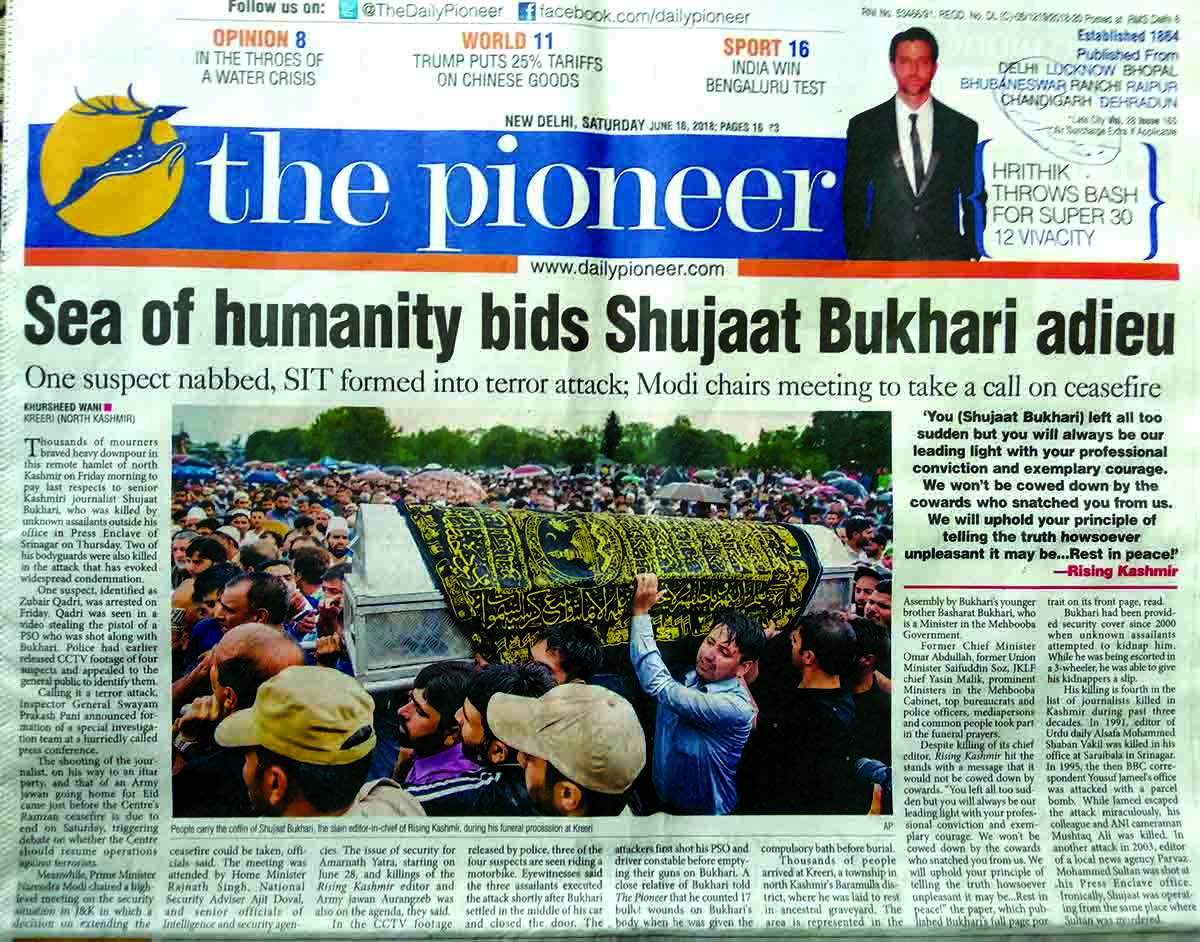by Khursheed Wani
The killers had no intention to alert or intimidate Shujaat Bukhari. They came to eliminate him and left the site only after their perverted mission was accomplished on June 14, evening. The use of assault rifles, timing of the attack and exactitude in hitting the target, indicated the attackers did a lot of groundwork before the hit and run. A week after the assassination, investigators are clueless on the identification of killers or tracking them down.

The front page lead in the Pioneer, a Delhi based newspaper, about Shujaat’s funeral
During past two decades of my journalism career, I have always seen Shujaat conspicuously around. In earlier days, the interactions were frequent between the reporters and Shujaat was amongst the prominent ones. He donned too many hats in later years that gradually drifted him from laborious ground reporting. A decade ago, he launched Rising Kashmir in his father’s name and subsequently became its editor after quitting the correspondent’s job at The Hindu. This gave him the freedom to venture into all fields of his interest. He was simultaneously a language activist, heritage enthusiast, public speaker, socialite and political commentator. He became a globe-trotting journalist and lived in a suitcase for most of the time attending and organizing conferences and workshops in foreign lands. Whenever we had a chance meeting, I would jokingly ask him, “tchi kar sa Kashiri aamut (when did you land in Kashmir)”, only to get a disarming smile.
Shujaat’s meteoric growth earned him a lot of friends as well as foes. He was always forthcoming for friends and acquaintances to help them out if they faced any difficulty. However, he could do little to stop a vitriolic campaign that began against him for the past few years. The campaign mainly targeted his financial growth and back channel activism. In Kashmir, and perhaps everywhere else, if a person chooses to go into oblivion, nobody bothers about his or her whereabouts, but if a person chooses to remain active on many fronts, he is minutely judged and scrutinized, even by the unrelated people. Shujaat was no exception.
My last detailed conversation with him was in this backdrop of Maqbool Sahil’s demise. Shujaat was accused of gaining sympathy over the tragedy as he uploaded a picture of Sahil’s motionless body on his FB wall. I wrote something pacifying and he immediately called me up after a brief WhatsApp chat. He was too dejected and rued the day he chose to start his own newspaper. “I had great opportunities in academics in the US. I could have settled there with my family. I sometimes regret as to why I invested my career, time and resources here,” he told me. I confronted him on an input a friend had given me that Shujaat did not give recommendation letter to Sahil to get him accreditation as a journalist from the government. In a jiffy, he sent me the copy of the letter and also narrated as to how he pleaded with members of the accreditation committee to recommend Sahil “much senior to me in the field of journalism”. He told me that he wept at a solitary place in Jammu as he received the shocking news and uploaded the picture in a highly emotional state. To be honest, Bukhari was the only journalist who stood by Sahil when he was in the toughest phase of his life after his arrest in an espionage case.
Shujaat was shrewd and well-informed, especially about journalists and their works. He would not hesitate to offer appreciation if someone wrote a captivating story. Once he called me to say that he read my full-page story on suicides in Kashmir in a flight and preserved the copy in his library. He told journalist Tariq Mir in my presence that he read his brilliant essay in a foreign publication on Kashmir situation during his stay in the US and circulated it on his twitter handle.
In July 2016, Shujaat unusually called me and asked if I could write an essay for his Urdu weekly Kashmir Parcham on the Burhan Wani phenomenon and its impact on Kashmir’s present and future. I was quite hard-pressed those days and told him that it was a time-consuming task. But since it was the first time Shujaat asked me to write for him, I couldn’t decline either. A few days later, he called me again to inform that the newspaper with my cover story was a big hit and they reprinted it several times. He asked my location so that he could deliver a few complimentary copies. Subsequently, he prevailed to get another essay from me for Parcham on why south Kashmir became the epicentre of resistance in Kashmir. One day he called me for a meeting at his office and offered the editorial responsibility of his weekly, which I politely declined owing to my other professional responsibilities. Sadly, that was the only meeting between us inside his office chambers. His little daughter was scurrying around and he smilingly introduced her as the ‘actual chief editor’ of the newspaper.
Shujaat was unique in the entire journalist tribe for his impeccable art of networking, his family background and journalistic and non-journalistic activities. This was simultaneously his strength and drawback. I wish he had only graduated to be an editor and strengthened his institution more firmly than he did. He was consumed by the conflict and we don’t know how long this conflict goes on consuming us.
A reporter feels elated when his story is splashed on top of a newspaper’s front page. On June 16, my copy was published in the same manner in The Pioneer but it drenched me in melancholy. It was about Shujaat’s last journey to the graveyard. We will always miss his company.
from Kashmir Life https://ift.tt/2KplMgU
via IFTTThttps://kashmirlife.net
No comments:
Post a Comment